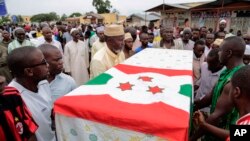2015 was a year of increasing repression across much of Africa, according to the annual report from Human Rights Watch.
The U.S.-based rights group says many African governments, especially in East and Central Africa, imposed new restrictions or pressure on opponents, journalists and rights activists, often to meet electoral goals.
It says the worst situation was in Burundi, where government security forces killed scores of demonstrators protesting President Pierre Nkurunziza's decision to run for a third term.
"The government's relentless crackdown forced most of Burundi's independent journalists and human rights defenders to flee the country due to repeated death threats, threats of prosecution on trumped-up charges, and beatings," the rights group said.
It says Ugandan authorities increased threats on journalists and radio stations ahead of elections this February, and Rwanda's government severely restricted free speech while promoting new laws that allow President Paul Kagame to stay in office until 2034.
The report says other countries, including Ethiopia, Angola, Zimbabwe and Swaziland, ignored calls to reform "draconian" laws and policies meant to suppress any potential opposition.
Human Rights Watch also accused the Sudanese military of using rape as a weapon of war in the Darfur region.
It said Somalia's government is still unable to provide basic security in the areas under its control, as al-Shabab militants continue to attack both government and civilian targets.
The group said another trend was "the failure of multiple governments to respond to serious allegations of unlawful killings, torture, sexual assault and other violations." It said South Sudan's government typified the trend, showing no accountability for the massive atrocities committed during the country's 26-month civil war.





